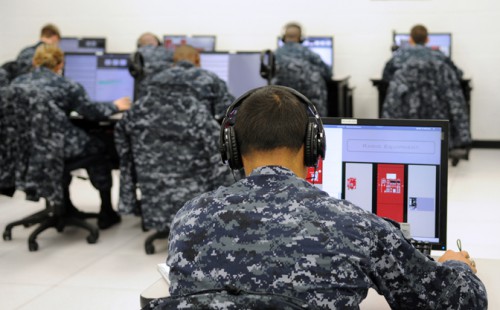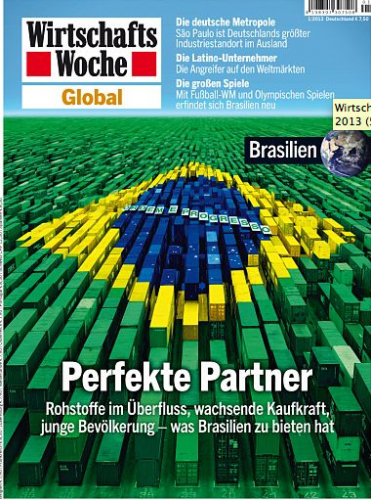samedi, 15 mars 2014
Information Warfare: New Face of Cold War

Information Warfare:
New Face of Cold War
|
Ex: http://www.strategic-culture.org |
|
Today one could only guess what the recently started, unprecedented in scope, anti-Russian campaign may lead to as mainstream Western media outlets are getting more and more involved in the effort. Russia has taken resolute steps to defend its vital interests in Crimea and Ukraine as the West unleashed a new form of cold war – information warfare…
The unanimity of German media condemning Russia evokes concern calling to mind historic precedents. A hundred years ago the Kaizer Germany unleashed the First World War; the German elite unanimously supported the government those days. As the issue of war expenditure was put to Reichstag, Karl Liebknecht happened to be the only Member of Parliament to abstain. (1) Military hysteria spread on political elite and creative intelligentsia including such well-known personalities as Richard Strauss, Thomas Mann and Hermann Hesse. Friedrich Meinecke, German historian who lived in the first half of last century, wrote that the people of Germany were deeply and irreversibly convinced that the war was imposed from outside and the people had their homes to defend in the most broad sense of the word. Reading these lines one can understand that the massive brainwashing campaign has made almost ¾ of Germans known to be frugal ready to support the new regime in Kiev while 12% believe it is acceptable to offer military aid. Over one third of respondents favor sanctions against Russia (1). The Berlin’s stance on Crimea and on Ukraine in general by and large coincides with that of the United States, though a bit more restrained. For instance, it took Germany some time to support the idea of excluding Russia from G8; it didn’t rush to make calls for urgent sanctions against Russia. With Germans obviously lacking fervor, Senator McCain started to rebuke them for being too passive. But don’t get taken in. Berlin sees Ukraine as a testing ground for the recently announced new, more assertive foreign policy. Angela Merkel does not find it possible to go on with the preparations for G8 summit. The German government has adopted a phased plan of imposing sanctions against Russia. Even German business elite hesitate when it comes to sanctions. For instance, Martin Wansleben, Managing Director of the Association of German Chambers of Industry and Commerce (DIHK), told Deutschlandfunk, «I don’t believe we can allow ourselves to impose any sanctions, it’s not our option. No matter that, the European Union must launch it». (2) It would be an exaggeration to say that Germans are under the spell of those who accuse Russia of committing an act of aggression. There are some things that prevent the mass psychosis, like new information technologies making it possible to watch footages showing the attacks by Maidan militants against Berkut soldiers or provocations by «unknown snipers»…Official media never post such video clips in Internet. Frankfurter Allgemeine Zeitung has already adopted the rule to avoid the stories about Ukrainian right-wing radicals and anything that pours water on the mill of Russian propaganda (3). Bruno Gollnisch, a French National Front activist, said France should not repeat the mistakes of the 1953 Crimean war fighting against Russia to serve the interests of Great Britain striving for world dominance (4). The French right-wing National Front has no doubts that the fight for Ukraine contradicts the interests of the European Union. This view is shared by ultra-right parties of old Europe. Bernhard Tomasitz, the editor-in-chief of the German People's Union’s media outlet, is sure that the new pro-Western regime has provoked the exacerbation of situation. One of its first steps was striking Ukraine’s Russian speakers by rescinding the law on the status of regional languages. The European Union normally defends the rights of minorities but this time it turned a blind eye. (Russians are not a «minority» in Ukraine) (5). The ultra-right in France and Austria believe that the federalization is quite an acceptable way to settle the Ukraine’s crisis. According to Andreas Meltzer, the leading candidate of Austrian People's Party at the elections to the European Parliament, the division of Ukraine the same way it was done in the case of Czechoslovakia would be a better alternative to civil war. (6) Andreas Meltzer is sure that Europe could get rid of the US influence and establish normal relations with Russia. In France only left-oriented media has reported that Dmitry Yarosh, the leader of Ukraine’s nationalists, has decided to run for presidency. Only left-wing media informs about recruitment centers for volunteers to man formations to be sent to Crimea. Yulia Timoshenko has threatened the peninsula with a guerilla war. Left Junge Welt tells about Pravy Sector’s absolute power in Lviv. It also tells about armed groups demanding recompense «for revolution» on the roads of western and central Ukraine (7). Tagesspiegel is not that candid, it shies away from calling a spade a spade telling about imposters who said they belonged to «people’s control» and tried seize two German factories (8) to the west of Kiev. It’s worth to pay special attention on the articles reflecting the point of view of big business. Such renowned economists as Michael Hutter and Hans-Werner Sinn warn about negative consequences of economic sanctions. The businessmen with direct interest in Russian economy are alarmed. Eckhard Cordes of the Committee on Eastern European Economic Relations and Volker Treier, Chief Economist for the German Chamber of Commerce and Industry, together voice their concern over the sanctions against Russia calling it a risky business which may cost dearly. E. Shoppe, chairman of machine building union in the East, expressed concern over negative affect of possible sanctions for German machine building competitivity. According to him, in case sanctions are imposed Russia will buy the machines and equipment it needs in China (9). Those down to earth reporters who specialize on economy go beyond strict ideological restrictions openly saying that for the majority of Germans Crimea is rather Russia than Ukraine (10). The concern of German entrepreneurs over the situation in Ukraine is understood, as well as their willingness to look for the ways to get things in order there. Will it be enough to stop the further negative development of events? Striking Russia-Germany ties directly corresponds to the goals cherished by the initiators of Transatlantic Trade and Investment Partnership agreement being pushed through by Washington. (1) The results of the poll published on March 7 2014
(3) www.faz.net/aktuell/politik/ausland/europa/ukraine-die-extremisten-vom-majdan-12816972-p2.html
(4) www.marinelepen.fr,.03.07. 2014.
(5) National Zeitung,.03. 07. 2014. The Verhovna Rada of Ukraine voted to rescind the law of February 23. A commission to work out a new legislature on language has already been formed in Kiev. One of the options for consideration is to cancel Cyrillic script for Latin.
(6) diepresse.com
(7) Reinhard Lauterbach. Rechte machen mobil/ Junge Welt, 08.03.2014.
(8) tagesspiegel.de
(9) dpa, 03. 07.2014.
(10) www.wiwo.de/politik/ausland/krise-in-der-ukraine-moskaus-geopolitische-arroganz/9560642-2.html.
(11) Bettina Röhl. Krim: Keine Eskalation herbeireden!/Wirtschaftswoche, 04.03.2014.
|
00:05 Publié dans Actualité, Défense | Lien permanent | Commentaires (0) | Tags : cyberguerre, information, politique internationale, défense |  |
|  del.icio.us |
del.icio.us |  |
|  Digg |
Digg | ![]() Facebook
Facebook



 A Wirtschaftswoche weekly reporter believes the following conditions are crucial for normalization of the Ukraine’s situation: first, the country has to stand on its own feet so that the new election would not take place in the atmosphere of despair as a result of economic failure, second, emotions need to be cooled down, third, President Putin should not be demonized anymore (11).
A Wirtschaftswoche weekly reporter believes the following conditions are crucial for normalization of the Ukraine’s situation: first, the country has to stand on its own feet so that the new election would not take place in the atmosphere of despair as a result of economic failure, second, emotions need to be cooled down, third, President Putin should not be demonized anymore (11).
Les commentaires sont fermés.